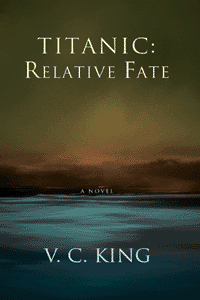
 The 1912 Titanic disaster casts a long shadow throughout the contemporary thriller, Titanic:Relative Fate. Filled with murder, suspense and a hint of the supernatural, this newest release from Canadian author V.C. King has earned her a publisher's choice award and the attention of readers far beyond Titanic enthusiasts. Recently, I had the opportunity to ask her about her inspiration for the story and Titanic's enduring legacy.
The 1912 Titanic disaster casts a long shadow throughout the contemporary thriller, Titanic:Relative Fate. Filled with murder, suspense and a hint of the supernatural, this newest release from Canadian author V.C. King has earned her a publisher's choice award and the attention of readers far beyond Titanic enthusiasts. Recently, I had the opportunity to ask her about her inspiration for the story and Titanic's enduring legacy.
(read blurb~previous post)
King: My erotic horror phase of writing was more of a diversion from my passion of creating novels, though last year, Writers Digest did honor one of the stories in my book Seven Sexy Tales of Terror, so I guess it wasn’t quite as bizarre as I originally thought.
Titanic: Relative Fate, on the other hand, was a story I’d wanted to write for many years. I don’t know why I’m fascinated by the story of Titanic’s loss, as so many people are. I wondered if it was all the what-if questions ... had just one thing been different, could the ship and her souls have been saved?
Perhaps it was what the senior surviving officer, Second Officer Lightoller, had said, “The disaster was just due to a combination of circumstances that never occurred before and can never occur again.”
I wanted to explore all these things … the idea of fate, tragedy, how ordinary people respond when faced with extraordinary events. But so much has happened since Titanic’s time—World Wars, terrorism, the threat of global warming …
… So, could it happen again?
I had to find out. It may sound crazy, but I had to get on board that ship. And the only way to do that was to build one, in my mind’s eye, from scratch.
This kind of research is often very tedious for a creative writer, but it paid off. I now had a far better understanding of what the passengers faced, and I reread survivor accounts with renewed fascination.
But could this incredible story be related in a contemporary setting? Thanks to tours of shipyards up and down the U.S. eastern seaboard, publications from the Royal Institute of Naval Architects in England and conversations with Canada’s Transportation Safety Board, I realized, yes, it was more than possible to write an intriguing, authentic tale about a modern-day Titanic.
No icebergs, though. Too cliché. But that, I discovered, was one of the notable differences between then and now. With a warmer North Atlantic, ice doesn’t cross Titanic’s path anymore.
L.A: What advice do you have for other authors considering self-publishing?
Subsequently, not only did Titanic: Relative Fate win an Editor’s Choice award through the publisher, but it also went on to achieve the Publisher’s Choice designation, an award endorsed by the bookseller Barnes and Noble, recognizing the novel’s editorial and design quality.
Therefore, my advice for any author starting out in the business, whether considering self-publishing or not, is to find a good editor. And trust that editor. They are the bridge between a good book and a great book that sells.
L.A: What's the greatest lesson from Titanic we've yet to learn?
L.A: What is your view on fate?
King: I’m paraphrasing the Swiss philosopher, Carl Jung, when I say, “The probability of a certain set of circumstances coming together in a meaningful (or tragic) way is so low that it simply cannot be considered mere coincidence.” If not coincidence, then what is it? Fate? Destiny?
Carl Jung would’ve been 36 years old at the time of Titanic’s sinking. I wonder what his thoughts were about the disaster. Certainly, if any of your readers have an idea, I’d be happy to hear from them.
To celebrate the first interview ever here on The Vortex (I know!) and to extend my heartfelt thanks to V.C. King for spending time with us, I'll be giving away an ebook, Adobe version of Titanic:Relative Fate to one lucky blog reader. Question or thought, Jung or otherwise, be sure to leave a comment before Monday, 12 am to be eligible.
Very intriguing, L.A. - Thanks for sharing the interview.
Jen FitzGerald
What a fascinating interview! I enjoyed reading about V.C. King's process for writing this book and the different aspects of the story she wanted to explore--thanks for sharing!
Nice interview, LA. You ask such great questions. You could've been a journalist. Keep that in mind for your next life *grin*.
I absolutely believe in Fate. I also believe there are ways to mitigate its consequences, for the better or worse depending on the actions of the individual.
I know. Deep stuff. I should write a book, huh?
That's a great interview. Probably good advice about getting a good editor, although I didn't go that route. Perhaps I should have.
I agree about great titles. I often let them inspire me to write stories.